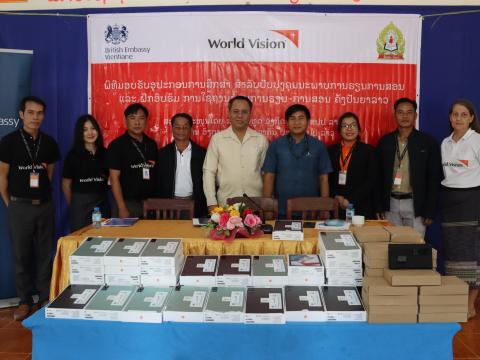The Ministry of Education, British Embassy Vientiane, and World Vision support digital learning in rural communities throughout Laos

Digital learning is scaled up to rural schools of Lao PDR.
Children and teachers from Xonnabuly district, Savannakhet province, can now benefit from new learning tools to enhance educational outcomes. In February, the British Embassy in Vientiane, World Vision, and the Ministry of Education and Sports (MoES) collectively provided 41 tablets to remote communities.
A ceremony was organised last week to hand over the tablets, protective equipment, and solar power banks to the teachers of 20 selected schools where World Vision partners with the MoES to improve the literacy abilities of primary school pupils from vulnerable communities. Mr. Vanpasert Keomanixay, Vice Governor of Xonnabuly district, co-chaired the ceremony with Mr. Homepheang Nutlienxay, representative of Xonnabuly District Education and Sports Bureau, and Mr. Salom Soukpaseuth, Technical Program Manager for World Vision in Savannakhet province. The aid agency’s education team and various representatives from the central level of the MoES took this opportunity to provide training to 34 teachers and three members of Xonnabuly District Education and Sports Bureau, where the handover ceremony and training took place.
This intervention comes a couple of years after the COVID-19 pandemic and its significant impact on the learning outcomes and futures of Lao children. This new educational material offers additional opportunities to learn outside the classroom and provides endless learning resources for all children, with different applications such as Khang Panya Lao, Lao Autism Talks, Learn Lao Alphabet, and Let’s Read in Laos installed on the devices. During the training, the teachers could set-up a Gmail account, and walk through the applications with guidance from World Vision and MoES staff.
This innovative way of sharing educational resources is now expanding to rural areas across Laos. While change can look scary at first, these tablets have already won the hearts of the trainees, and increased collaboration between the teachers was clear during the training.

“We are very proud to have the tablets to teach children in rural areas, the most satisfying thing is that there is Early Education Classroom tools on the tablets like different games, songs, and stories which I think children will like” expressed one of the 34 teachers trained. Another trainee also declared, “This is the first time we have ever used a tablet and taught using a big screen. In the past, we have only used our mobile phones and have not experienced using the tablets”.
British Ambassador to Laos, John Pearson said:
“Education is a key priority for the British Government in Laos. The strongest asset that Laos has is its young population – so it is essential that they receive a good quality of education. We are very pleased to have worked with such a well-respected organisation like World Vision on this project”.
“From the first day when teachers had never seen a tablet before, to the excellent peer-to-peer learning as teachers helped each other work their way through the different programs. This initiative is already a success in adopting new teaching and learning patterns to rural areas,” comments Savivanh Vongxaiya, Education & Early Childhood Coordinator for World Vision.

The British Embassy Vientiane and World Vision are committed to helping all Lao children build a brighter future through education and are supporting the Lao Government to achieve Sustainable Development Goal 4 by delivering inclusive and equitable quality education and promoting lifelong opportunities for all.